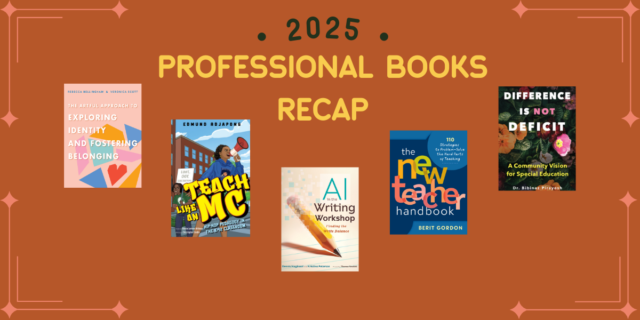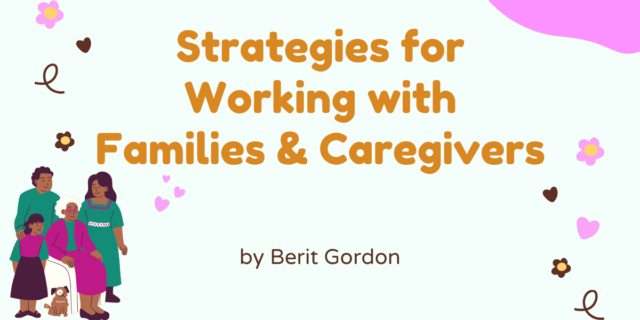
In this second episode of our two-part series for early career educators, long-time teacher and author, Berit Gordon, explores practical, compassionate strategies that center both teacher growth and administrator sustainability.
Berit, author of The New Teacher Handbook, highlights how bite-sized professional development and human-centered leadership can shift the culture for new educators and the students they serve. She explains how her book serves as a recipe guide for creating supportive, manageable routines, and why giving yourself and others permission to be good enough is sometimes the most powerful leadership move of all.
If you're invested in teacher retention, this episode is for you.
Transcript
Zoë Ryder White:
Almost anyone working in a school at any level in any role, I think, can make use of this book. I'm wondering if you could talk a little bit about how the book will particularly appeal to administrators, even to coaches.
Berit Gordon:
I see so many administrators, they also, just like there's more on teachers' plates, there's so much more on administrators' plates. They have so much to do, and they're making do with less, and they're getting these cohorts of new teachers. I love that in a lot of districts where I work, there is some new attention toward how to actually help them, we're not just going to let them flail. But even if you're committed to it, even if your philosophy is we want to support you, once the year starts, all the coaching and mentors, very often everyone is busy. Everyone has so much to do. And so as long as you see that new teacher is okay, you let them go and you're putting out fires in other ways.
And so I feel like having this book with the videos, with the strategies, it's such an easy way to set up quality, bite-sized PD and even to give it as a leave behind. So if you started new teachers with this say in a summer training program, and they know how to use the book, they know how to access the resources, then later on in a year when they say, "Yeah, I just am really struggling with management. My kids just aren't listening to me," you can say, "Great. Why don't we pick a few strategies in chapter three, and I'll check in with you in a couple weeks." Or a coach could say, "Hey, I hear a few of you really need help with making your lesson plan feel more efficient and still have it be working. I'm going to do a quick 15-minute thing. We're each going to choose a few strategies, and we'll circle back next week and see how that went."
And so it's a vetted resource. I just feel like administrators, coaches, everybody wants to help new teachers, but where is that recipe book that we can give them so that they know how to cook?
Zoë:
Right, right.
Berit:
And again, they don't have to cook gourmet. It's just helping them put a decent meal on the table so that they feel like at the end of the year, I'm doing this. I've honed some skills.
Zoë:
Right, and I think it keeps the expectations realistic too. You're not trying to tell new teachers that they're supposed to be suddenly perfect at every single thing.
Berit:
Right.
Zoë:
You just have to be good enough to connect with your kids most of all, right?
Berit:
Yes.
Zoë:
That's the main goal. And to pick a few things to work on, and then you can pick a few different things to work on as you evolve and as you get certain things down.
Berit:
I love that you said the good enough because I would say that is what I try to project throughout. Even though I'm giving these strategies, I try to introduce a lot of them with my own failure stories and my own learning curve because new teachers need to be kind to themselves. They really do. They need to be kind to their students, and they need to be kind to themselves.
And I think part of the way that I introduce strategies, which is be gentle, allow that mistake to happen and then just do better the next day, and here's a way to do it. I think when they're kind to themselves, they're actually kinder to students too. And when they're in that pressure cooker and they're putting themselves in a pressure cooker, that's when they get a little bit heavy-handed, and it translates right into their classroom. They need strategies, and they need people reminding them, it's okay. It's going to get better, and here's one way to feel a bit better tomorrow.
Zoë:
You're reminding me of one of my own teaching mentors who I had the good luck to co-teach in a class for a year, a kindergarten class with a really gifted special ed teacher. At one point in the year, she gave me some difficult feedback. I think she said something like, "Forgive me for saying so, but you talk altogether too much for these kids." Because that's my nervous response in the classroom is to just keep talking and talking and talking. Especially for little kids, you can't. And I was crushed to get that kind of feedback. And she basically said, "It's just feedback. Come on. I'm not expecting you to be really good at this right away. I'm just telling you-,"
Berit:
Here's one thing.
Zoë:
"...this is something to work on. Here's one thing, try to say a little less tomorrow," and that's how your book feels to me. It's like a mentorship in a book.
Berit:
Right. And, oh, I love that you were able to hear it, but part of that was you had this person that you knew was on your side, you knew she was cheering you on. And sometimes I know for new teachers if all they're getting is the isolated evaluative feedback that principals have to give, or even uniform coaching feedback, it can feel a little punitive or harsh, and they need that warm voice still telling them, "You've got this. You've got this. You have it in you. You joined this profession because you care about kids."
I don't know a single person who enters teaching who doesn't do it without deeply caring about kids, and yet we all know that a few months in it doesn't look like that, but it's really just because they're struggling. And so how do we use any resource or coaching to help them feel that support again so that they can feel the love?
Zoë:
Yeah, and feel the love. And coaches too, because in the book you have the coaching section, and I find that it does a few different things at once. It supports coaches in their own growth, for one thing, I think. Like, here's a way to be a warm mentor.
Berit:
And here's some very specific steps.
Zoë:
And here's some specific moves and some ideas.
Berit:
[inaudible 00:06:56] to teachers.
Zoë:
Ways that you can approach this in a really warm way. And it also, I think it's cool that it's in there for the teachers to see too. A way to connect-
Berit:
Well, you're right. It's transparent.
Zoë:
Yeah, it makes transparent where a coach might be coming from.
Berit:
Right.
Zoë:
And you even name some of the things that are hard for coaches. So even coaches, even your mentor, even the people who are helping you along struggle with things too, and making that all out in the open I think is a really, it's just a healthy way to communicate and grow new teachers.
Berit:
Well, the strategy too about how to gain rapport with your principals is remember, they're people too.
Zoë:
Right, right.
Berit:
They're also struggling and figuring it out.
Zoë:
You approach from the perspective of wanting to help the whole teacher. So when you're talking about managing a teaching life, you're talking about how to manage the school part of it. And also you have some strategies for how their lives at home can be. It's not invasive, like, "Here's what you do at home." But you offer some strategies for how to make meal planning easier, how to make choosing what you wear easier. And I think that's really, it's just a really lovely way to consider the whole human who's going into this profession. I feel like it's just a really loving, inviting approach.
And with each of these goals, you do the same thing, and so you're considering the whole teacher. You're also considering the whole child, which is, of course, the goal. And I think that's what gets lost in the equation when new teachers aren't feeling satisfied and fulfilled in their roles. They're stressed and they shut down. I know that the times, especially when I was a newer teacher when I was struggling the most, I wasn't able to see my students as clearly either. So I think everything, it's interesting, it's a book for teachers, but I think another result is that a lot of students are going to be seen.
Berit:
There's that, and that's what we want. And I love that you're saying that because it really does come out of that. We've become so much better in schools of being aware of the whole student and what's going on in their lives and that their emotions are valid and meeting them where they're at. I don't think we've quite caught up with teachers. And so part of it is doing the same thing with teachers, of really figuring out what do you need, how can I help you feel successful, and treating them as a human being who has complicated histories and all of that, and how do we set you up for success?
And it really is. The book absolutely is what I learned worked with students is what I have learned works with the new teachers. And this is true whether I'm in Nova Scotia or Idaho or wherever it is, there's a common thread among these new teachers where just they're all looking for ways to ease the struggle and boost the feel-good parts of the job where they feel like, right, my students are really getting something out of this.
Edie:
Thanks for tuning in today. You can order Berit's new book and read a full transcript at blog.heinemann.com. And don't forget, this is just one part of a two-part series, so if you liked it, check out the other episode as well.
About the Author

Berit Gordon brings many years of teaching experience in New York City schools as well as in the Dominican Republic to her literacy coaching work. She is a graduate and former instructor at Teachers College, Columbia University. Berit is the author of No More Fake Reading, and The Joyful Teacher. Whether running workshops, leading literacy coaching sessions, or working in classrooms, Gordon strives to help students fall in love with reading and writing, and to lay the groundwork so they are experts at both for life. She lives with her family in Maplewood, New Jersey.
You can connect with her on her website at BeritGordon.com.


